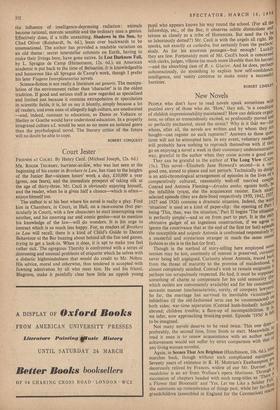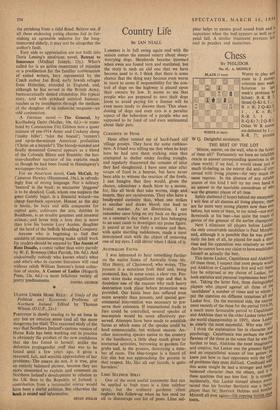New Novels
PEOPLE who don't have to read novels speak sometimes with puzzled envy of those who do. 'How,' they ask, `is a condition of childish impressionability maintained? How can delicate organ; isms, so often so tremendously excited, so profoundly moved and so perfectly enchanted, stand the strain? Why is it that we—Or whom, after all, the novels are written and by whom they are bought—can register no such raptures?' Answers to these ques- tions will not be attempted here. In any event, voluntary readers will probably have nothing to reproach themselves with if theY go on enjoying a novel a week in their customary undemonstrative way, grateful to the author when they come across a good one.
They can be grateful to the author of The Long View (CaPe, 15s.). This novel—Elizabeth Jane Howard's second—is a very good one, aimed to please and not perturb. Technically its design is an anti-chronological arrangement of episodes in the lives of a comparatively cultured, reasonably well-off married couple' Conrad and Antonia Fleming—Arcades ambo, egoists both, 13,e the infallible tyrant, she the acquiescent resister. Each nicely selected episode (they are date-lined respectively 1950, 1942, 193' 1927 and 1926) contains a dramatic situation. Indeed, the via; `situation' is used as a kind of paper-clip : the opening of Part being 'This, then, was the situation,' Part II begins `The situation is perfectly simple'—and so on from part to part. It is the only obtrusive gadget of an ingenious construction, if we agree te ignore the contrivance that at the end of the first (or last) episode the susceptible and soignée Antonia is confronted responsively by a masterful and mysterious stranger in much the same casual fashion as she is in the last (or first). Though in the method of story-telling here employed sale tension may be lost, continuity of interest is preserved, curiosl never being left unpiqued. Curiosity about Antonia, traced bac„ from the threat of maturity to the promise of maidenhood, I.: almost completely satisfied. Conrad's wish to remain enigmatic perhaps too scrupulously respected. He had, it must be suppose° something of charm to compensate for his cold sensuality (f°, ,1, which outlets are conveniently available) and for his consistently sarcastic manner (uncharacteristic, surely, of company lawyers). So far, the marriage has survived its inevitable vicissitudes--; infidelities (if the old-fashioned term can be countenanced) dl' both sides; war-time separation (Conrad hush-hushed); holidays s, abroad; children trouble; a flare-up of incompatibilities. 1St we infer, now approaching breaking-point. Episode '1956' is lei to be imagined. Not many novels deserve to be read twice. This one does--13 preferably, the second time, from finish to start. Meanwhile, 15e read it once is to renew acquaintance with an author wil°,,/ achievement would not suffer by strict comparison with that v any living woman novelist. Again, in Scenes That Are Brightest (Hutchinson, 10s. 6d.), time marches back, though without such complicated equirle"re Seventy years of existence in R. H. Mottram's Easthampton,aer decorously relived by Frances, widow of our Mr. Dormer• madeleine is an air from Wallace's opera Maritana. Through is succession of chapters headed with such song-titles as 'Thera!!: a Flower that Bloometh' and 'Yes, Let me Like a Soldier Fa, she summons up remembrance of things past, while her far-111-70 grandchildren (assembled in England for the Coronation) rese
the perishing from a tidal flood. Believe me, if all these endearing yoiing charms fail in fur- nishing an agreeable sedative for the long- memoried elderly, it may not be altogether the author's fault.
Easy aids to appreciation are not built into Doris Lessing's unafrican novel, Retreat to Innocence (Michael Joseph, 15s.). What's called for is an active resentment of injustice or a predilection for the familiar conversation of exiled writers, here represented by the Czech author Jan Brod, early Jewish refugee from Hitlerism, stranded in England, and, although he has served in the British Army, bureaucratically denied citizenship. His typical story, told with subdued satirical humour, reaches us by instalments through the medium of the daughter of an industrial magnate—an odd conjunction.
A German novel — The General, by Karlludwig Opitz (Muller, 10s. 6d.)—is trans- lated by Constantine Fitz Gibbon into a queer mixture of pre-1914 Army and Cockney slang ('cushy billet'; 'take the biscuit'; 'rozzers') and up-to-the-minute American profanities ('Christ on a bicycle!'). The bloody-minded and finally demented General appears as a blend of the Colonels Blimp and Bramble; the bat- man-chauffeur narrator of his exploits reads as though he had been found in Hemingway's wastepaper-basket.
For an American novel, Cash McCall, by Cameron Hawley (Hammond, 16s.), is refresh- ingly free of strong language. Not a solitary 'bastard' in the book: to encounter 'doggone' is to be shocked. Cash, whom one suspects the great Gatsby begat, is a financial wizard—no cheap fast-buck operator. Honest as the day is hectic, he buys and sells companies for capital gain, cultivates the arts, dabbles in Buddhism, is an erudite gourmet and amateur airman, and loves with a love that is more than love his bonnie Lory Austen, daughter of the head of the Suffolk Moulding Company.
Anyone who is beginning to find that accounts of mountaineering make uphill work for readers. should be amused by The Ascent of Rum Doodle, a comic rather than witty parody by W. E. Bowman (Max Parrish, 10s. 6d.). And undoubtedly nobody who knows what's what and who's who in current literature will read without relish William Sansom's latest collec- tion of stories, A Contest of Ladles (Hogarth Press, 13s. 6d.)—a most felicitous variety of



































 Previous page
Previous page